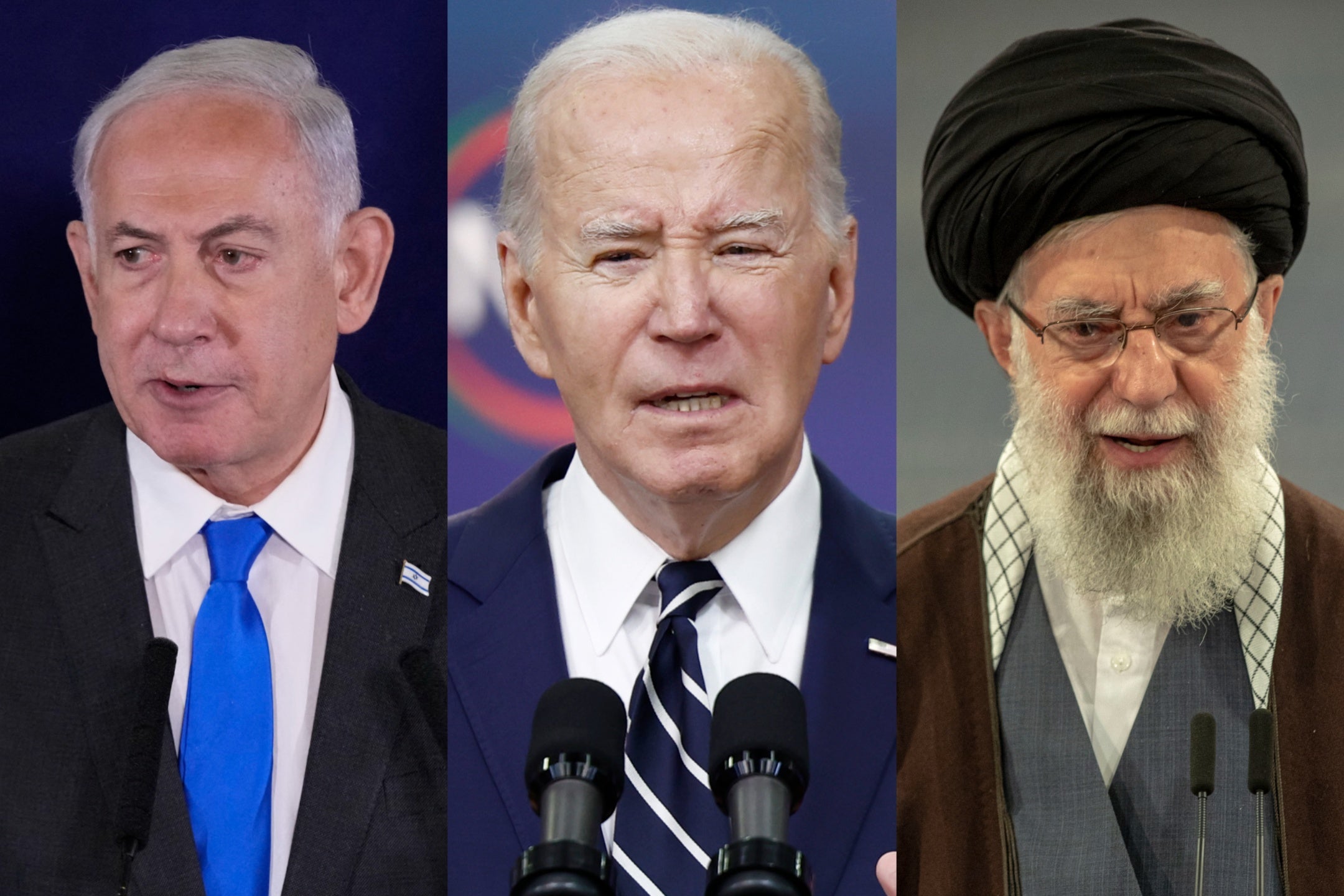‘As bad as its ever been’: Relations between the US, Iran and Israel worry insiders
‘Something changed in terms of the nature of the rules of the game in the Middle East in a fairly negative way,’ former vice presidential national security adviser tells Gustaf Kilander


President Joe Biden warned Benjamin Netanyahu, Israel’s prime minister, that the US would not take part in a counterattack against Iran after it launched 330 drones, cruise, and ballistic missiles at Israel.
Almost all of those strikes, launched on Saturday, were shot down — and the US urged Israel not to retaliate. Despite that, Israel has said that it will “exact a price” for the attack.
The Iranian strikes came after Israel struck the Iranian embassy compound in Damascus, Syria, killing several top military officials of the Islamic Revolutionary Guard Corps (IRGC).
Beni Sabti, a researcher in the Iran program at the Institute for National Security Studies, a think tank connected to Tel Aviv University, tells The Independent that “it’s because of US weakness in its attitude toward the Middle East countries and also Israel” that current relations in the region are so tense. That, he adds, is a “very good situation for Iran”.
‘Escalation carries a high risk of a wider regional war’
Linda Robinson, a senior fellow for women and foreign policy at the Council on Foreign Relations, tells The Independent in an email that “President Biden has clearly stated it is in the US and Israel’s interest for Israel to avoid direct strikes on Iranian territory”.
“Escalation carries a high risk of a wider regional war, and the imperative should instead be to concentrate on bringing hostages home through a ceasefire, increasing humanitarian relief, and winding down the Gaza war,” she writes.
About 1,200 people were killed in the October 7 attack on Israel by Hamas, and more than 33,000 people have been killed in Gaza in the following counteroffensive.
John Hannah, who served as national security adviser to then vice president Dick Cheney from 2005 until 2009, says that the taking down of hundreds of Iranian missiles was a “huge success for the US-Israel strategic relationship”.

“For a lot of countries around the world, particularly in the Middle East, that might be questioning what's the value of having America as a partner ... it’s hard to think of any other countries in the world that could have brought this together,” he adds.
Robinson adds: “From a defense perspective, the combined effort to defend Israel from the variety of missile and drone attacks was a highly successful demonstration of the new Middle East air defense arrangement. This is part of what the Israeli normalization process with Arab countries has brought about.”
‘All options are on the table’
Tal Rabina, the strategic director of the Europe Israel Press Association, emphasizes that “we are living in an era of uncertainty”.
“To be frank, all options are on the table,” he tells The Independent.
Hannah says there appears to be “a lot of nervousness” in the Biden administration “about the potential that we could get into a downward spiral that triggers some kind of larger regional war that potentially America gets dragged into”.
Both Rabina and Sabti mention the election year as crucial when it comes to analysing US policy on the situation.
“One has a lot of questions here,” Rabina says. “Whether the election year is a greater factor than it should be; whether the Americans are really considering all the effects of Israel not responding.”
“I know Biden is in an election year. It’s a very big problem,” Sabti says, adding that Israel needs to be very careful every time Americans go to the polls.

“[The] US doesn’t want any ... big confrontations. [The] US doesn’t want Hezbollah to get into the war,” he adds.
Sabti argues that Iran sees any concessions not as a reason to “stay quiet” but as “a sign of weakness”.
“They will retaliate all the time if you give them some benefits,” he says.
Hannah adds that during an election year, “the last thing an incumbent administration wants is the perception that the world is spinning out of control on its watch as people go to the polls”.
“I can’t really think of any rationale for that public display of differences and separation from Israel, other than a domestic political one for part of the president’s ... political base,” he adds.
‘The part the Iranians missed’
But Sabti also argues Iran may have misinterpreted the situation and overplayed their hand.
“They may [have] assessed and thought that [the] US is going to neglect [or] abandon Israel forever, almost even [punish] Israel, but they are wrong because the alliance between Israel and the US is so strong,” he says. “Israel [has] a special place in America … It’s so obvious. It’s not only about financial aid or munitions, it’s about being part of each other … The existence [of] Israel is really important for America. This is the part that the Iranians missed in this puzzle.”
Hannah tells The Independent that public disagreements between Israel and the US may have led to miscalculations on the part of Iran and its proxies. Other countries have ended up believing that the US and Israel are further apart than they are – miscalculations “that the United States definitely doesn't want to want to encourage”.
“I think there’s certainly a perception that the relationship has been severely strained over the war in Gaza and Israel's conduct of the war,” he adds.

But Hannah doesn’t believe US influence in Israel has waned.
“Speaking as somebody who’s witnessed the back-and-forth [with] Israel — including at times when we did have real differences — the only thing standing between Israel and potentially complete and utter international isolation is the support of the United States,” he says.
“America is absolutely central to Israel’s national security doctrine for all kinds of reasons, not just the military aid and support,” he adds. “... And therefore, whenever the United States says something, Israel certainly listens.”
Rabina also argues that US influence in Israel remains strong even as the relationship between Biden and Netanyahu appears strained.
“I think that if Netanyahu was not listening, he would [have entered] Rafah a long time ago,” he says, of the Gazan border town to which many refugees fled during Israeli bombardment. “I think that if Netanyahu was not listening, he would [have gone] to Lebanon three months ago … He’s a very hard talker, but a very careful doer.”
White House spokesperson John Kirby said last Thursday that the “United States has never before so extensively, and so directly defended Israel from attack” and urged Congress to pass further aid to Israel. At the same time, Biden emphasised that “the United States is committed to a ceasefire [in Gaza] that will bring the hostages home and prevent the conflict from spreading”.
‘It’s impossible for Israel not to react’
Sabti argues that US policy remains “weak” in the region: “They want Israel not to react and only play like a defensive team and not to respond to the Iranian aggression.”
“I think it’s impossible for Israel not to react,” he says, noting that Iran is a pariah state in the region with few friends but plenty of enemies. “If the US is going to do nothing, Israel feels alone and I can say that in history when Israel [feels] alone, it wasn’t good for the other side.”
“The Obama administration had what I would say [was a] naive perception of the Middle East, thinking that if we just let the people do the Arab Spring, democracy will prevail. We all know the outcomes,” Rabina recalls of the 2010 movement.

“The only outcome of this foreign American policy was that Russia and China got in deeper and deeper,” building a close relationship with Iran, Rabina notes.
“One should remember it’s the first time Iran is not hiding behind these proxies,” he adds. Acting directly against Israel sends a definite signal and “if you are being perceived as weak, [others] will look at it as an opportunity to start a war against you. If you don’t hit back, they might think that you cannot hit back.”
Hannah argues that the current situation between Iran and Israel is as bad as “it’s ever been”.
Iran has been a problem ever since the Islamic Revolution of 1979, he adds: “It was a terrible problem 20 years ago when I was in the White House and having to deal with US forces getting blown up in Iraq by Iranian IEDs and Iranian militias. The difference now, of course, is that Iran is in an alliance of sorts with our two main strategic competitors on the global stage, China and Russia, to different degrees, and also a very close relationship with a third nuclear power – North Korea.”
“It could have happened this weekend. God forbid one of those ballistic missiles with a 2,000-pound war-head had gone off course and hit a major population centre in Israel. We’d be in a major war today,” he adds. “We’re close to that happening and nobody [intends] it to happen. But like World War One ... the dogs of war have a logic all of their own.”
“Something changed on Saturday night in terms of the nature of the rules of the game in the Middle East in a fairly negative way,” he says. “We’ll see how that plays out.”
Bookmark popover
Removed from bookmarks